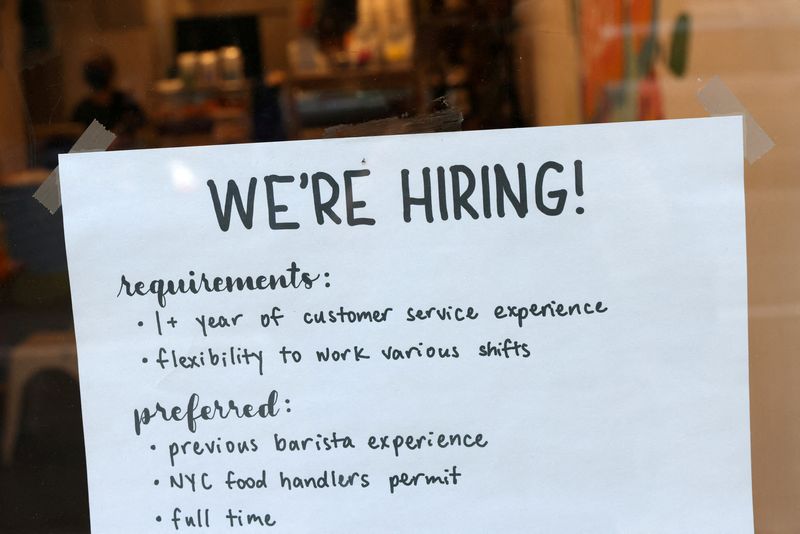A look at the day ahead in U.S. and global markets from Mike Dolan.
Whatever quarterly growth statistics are showing, there's little sign yet of looming recession in U.S. employment.
And if the Federal Reserve sees a tight U.S. labour market as both a window and a reason to aggressively tackle inflation, then this week's readouts on hiring confirm the more hawkish interest rate horizon now being priced by markets.
Stocks wobbled again after the numbers and two-year Treasury yields are hovering just under 3.5%, their highest since just before the banking crash of 2007/08. Inflation-adjusted two-year yields from the index-linked bond market are at their highest since the pandemic hit.
But Tuesday's surprisingly strong report on U.S. job vacancies was for the month of July, during a bout of summer optimism in U.S. markets around peak inflation. August readings on private sector jobs from ADP later on Wednesday and the national payrolls report on Friday will test how durable corporate hiring plans have been since.
Consensus forecasts for both are strong, with the ADP expected to show job growth of 288,000 this month - more than twice the pace of July's increase.
Awaiting the report, there was no bounce in world stock markets or Wall St futures - with euro zone inflation showing few signs of peaking just as Russia started a 3-day gas outage through its Nordstream 1 pipeline amid doubts about when or even whether it will resume.
Headline and core euro zone inflation exceeded expectations this month, with the former hitting 9.1% for the first time.
Markets are now leaning toward 75 basis point interest rate hikes from both the Fed and the European Central Bank next month, with euro zone government borrowing rates climbing sharply to reflect that.
Borrowing costs in Germany are likely to end August with their biggest monthly surge in over 30 years.
While this has helped stabilised the euro against the dollar this week, the greenback remains pumped up against sterling, Japan's yen and China's yuan.
The Bank of Japan shows no sign of joining the other G7 central banks in tightening as the economic recovery sputters. China's central bank is trying to slow the pace of yuan losses as COVID-19 flare-ups and lockdowns pick up.
The only positive development in the inflation picture is that crude oil prices are falling again - partly reflecting the recessionary storm clouds gathering.
Key developments that should provide more direction to U.S. markets later on Wednesday:
* U.S. August ADP private sector jobs

* Chicago PMI for August
* Dallas Fed chief Lorie Logan, Cleveland Fed chief Loretta Mester, Atlanta Fed chief Raphael Bostic all scheduled to speak
* U.S. Corporate Earnings: Cooper Companies, Brown-Forman